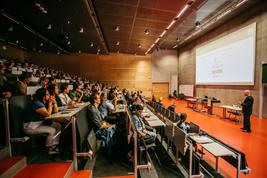31.08.2022
Press Release

The International Congress of the European Society for Agronomy (ESA) started in Potsdam on 29 August 2022. Under the motto "Diversification & Digitalization – Trends that shape future agriculture", researchers will be discussing ways to achieve climate-adapted, resource-conserving and digitalized agriculture until 2 September 2022. The Leibniz Centre for Agricultural Landscape Research (ZALF) is hosting the conference this year.
The European Society for Agronomy (ESA), an international network of agricultural researchers, holds a conference every two years. A total of 243 participants from 26 countries are gathering at the venue at the University of Potsdam for this year's conference.
Digitalization and diversity in the field
The central theme of the conference is the question of how digitalization can help to overcome challenges in agriculture, such as climate change or the loss of biodiversity. The conference guests will be discussing the thesis that improved monitoring of soil, water balance and plant growth by means of digital sensors or a higher degree of automation in the field with the aid of agricultural robotics will make it possible to make crop cultivation more diverse. A greater variety of arable crops and methods of cultivation that suit the respective site conditions should promote the preservation of soil fertility, groundwater quality and biodiversity, as well as reduce the emission of climate gases from agricultural soils.
Understanding climate and landscape processes with computer simulations
As President of the ESA, Professor Claas Nendel, expert in agroecosystem modeling at ZALF and professor of landscape systems analysis at the University of Potsdam, opened the conference. At ZALF, Nendel is Co-Head of the "Data Analysis & Simulation" research platform. Nendel and his team work on computer models in which they illustrate, among other things, the effects of climate change on agriculture or processes in differently designed landscapes on plant growth. Simulations are a key component of digitalization in agriculture "They are a very good tool for rethinking agriculture. They help to understand how arable farming and the environment can become more resilient to phenomena such as drought or heavy rainfall, or how biodiversity can be protected", Nendel explains.
Resource efficiency for crop production and animal husbandry
In the conference program, international agricultural researchers will present their work on computer simulations as well as field and laboratory experiments. One of the central topics of the conference will focus on further digital solutions, such as smart, networked sensor technology and robotics for precision agriculture. The participants will also discuss approaches to reduce the large-scale use of synthetic chemical pesticides in agriculture and at the same time benefit from higher biodiversity through stable yields. Another topic of the conference focuses on the question of how crop production and animal husbandry can be combined. Participants will present approaches for resource-efficient cycles from the cultivation and management of grassland, forage crops and fertilization.
Cooperation between research and practice in landscape laboratories
This year's conference participants will be offered excursions to test areas of ZALF and its partner institutions. One of the destinations for the excursions is the ZALF patchCROP landscape laboratory. Here a research team is investigating the advantages of digitalization and small-scale, diverse cultivation in cooperation with a practice-based farm. Other excursions will take participants to the ZALF AgroScapeLab Quillow landscape laboratory, to the Spreewald Biosphere Reserve and to agroforestry test areas at the Eberswalde University for Sustainable Development (HNEE).
 Press Release as PDF file
Press Release as PDF file
Project Partners:
- University of Potsdam
- Eberswalde University for Sustainable Development (HNEE)
- Spreewald Biosphere Reserve
Funding:
The conference is supported by the German Research Foundation (DFG).
Further information:
Pictures
For downloading the pictures please click on a picture and use the icon.

